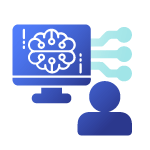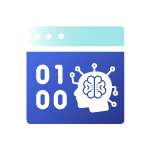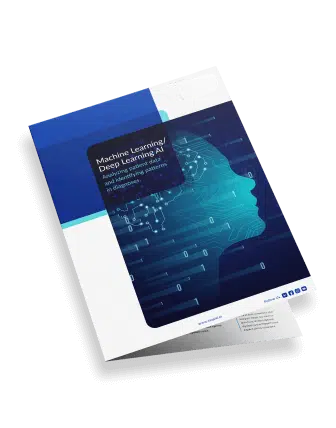Home » AI/ML/Dl » NLP in Healthcare

Why Clinical NLP Technology for Healthcare Risk Adjustment?
Clinical NLP technology enhances healthcare risk adjustment by:
SPEAK TO AN EXPERT>
How is NLP used in healthcare risk adjustment?
NLP technology empowers value-based care (VBC) organizations by extracting critical insights from clinical notes and unstructured data with high accuracy and efficiency.
By utilizing machine learning algorithms, NLP processes vast medical records to identify essential diagnostic codes, ensuring precise risk adjustment. This enhances care quality while optimizing provider reimbursements by accurately reflecting patient conditions.
SPEAK TO AN EXPERT>
Why Metacare AI’s Clinical NLP Technology for Risk Adjustment in Healthcare?
The healthcare industry is rapidly evolving, with technology playing a pivotal role in transformation. Metacare AI’s clinical NLP (Natural Language Processing) has been leveraged for millions of patient chart reviews and retrospective audits, streamlining risk adjustment in healthcare.
This advanced NLP technology efficiently analyzes unstructured data from multiple sources, including electronic health records (EHRs) and clinical documentation. By automating data extraction, it reduces manual workload, enhances accuracy, and boosts efficiency. Clinicians can focus on patient care rather than tedious audits, while precise diagnosis coding ensures optimal reimbursement.
SPEAK TO AN EXPERT>

Leverage machine learning (ML) algorithms to process natural language text and accurately extract key clinical insights.

Automate medical coding and billing documentation to save time while enhancing accuracy in this critical healthcare process.

Accurately identifying high-risk patients enables providers to develop targeted care plans that enhance outcomes and reduce costs. Traditional risk adjustment methods, however, rely on manual chart reviews, which are time-consuming and error-prone.
NLP technology automates data extraction from clinical documentation, generating predictive insights with greater efficiency and precision. By detecting patterns often missed by human reviewers, NLP significantly improves coding accuracy and risk assessment.
Additionally, real-time patient data monitoring allows for timely interventions, which is critical for chronic disease management and preventative care strategies.
Beyond individual patient benefits, NLP strengthens population health management by offering deep insights into disease prevalence and distribution across communities.
Incorporating NLP into healthcare risk adjustment optimizes efficiency, reduces costs, and improves patient outcomes—making it an indispensable solution for modern healthcare systems.
The role of NLP technology in healthcare risk adjustment is invaluable. By leveraging natural language processing, providers can precisely identify and code patient conditions, ensuring proper reimbursement while improving chronic disease tracking and management.
Additionally, NLP-driven automation streamlines ICD-10 and HCC coding, reducing manual workloads and physician burnout. This allows healthcare professionals to dedicate more time to patient care rather than administrative tasks.
With the shift toward value-based care, accurate risk adjustment is critical. NLP technology ensures patients receive tailored, appropriate care while minimizing unnecessary expenses.
Incorporating NLP in healthcare risk adjustment enhances coding accuracy and efficiency while improving patient outcomes by delivering personalized care aligned with their medical needs.
Natural language processing (NLP) enables healthcare providers to efficiently extract key insights from medical records, including diagnoses, medications, and treatment plans—enhancing accuracy and reducing data entry errors.
NLP also uncovers hidden patterns in patient data, identifying correlations between medications and adverse effects or tracking chronic disease progression over time.
Additionally, NLP supports clinical decision-making by delivering evidence-based recommendations for diagnoses and treatments, leveraging the latest medical research.
By rapidly processing vast amounts of unstructured clinical text, NLP enhances patient outcomes and reduces costs tied to inefficient manual record-keeping processes.
Natural language processing (NLP) plays a crucial role in healthcare decision support by extracting meaningful insights from vast amounts of unstructured clinical data.
NLP empowers clinicians to identify patterns in medical records, enabling more informed decision-making that enhances patient outcomes. Additionally, it reduces administrative burdens by automating tasks like coding diagnoses and procedures, allowing physicians to focus on patient care.
Beyond clinical applications, NLP accelerates medical research by analyzing large datasets for trends and discoveries, unlocking new treatment possibilities.
As NLP technology continues to evolve, its impact on healthcare decision support will further revolutionize patient care, efficiency, and innovation.
Choosing the right natural language processing (NLP) solution for healthcare risk adjustment requires careful consideration of key factors to ensure accuracy and efficiency.
By prioritizing these factors, healthcare providers can adopt an NLP solution that enhances risk adjustment accuracy while improving patient care and operational efficiency.